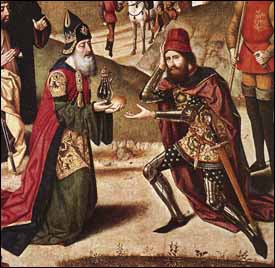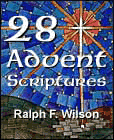Free E-Mail
Bible Studies
Beginning the Journey (for new Christians). en Español
Old Testament
Abraham
Jacob
Moses
Joshua
Gideon
David, Life of
Elijah
Psalms
Solomon
Songs of Ascent (Ps 120-135)
Isaiah
Advent/Messianic Scriptures
Daniel
Rebuild & Renew: Post-Exilic Books
Gospels
Christmas Incarnation
(Mt, Lk)
Sermon on the Mount
(Mt 5-7)
Mark
Luke's
Gospel
John's Gospel
7 Last Words of Christ
Parables
Jesus and the Kingdom
Resurrection
Apostle Peter
Acts
The Early Church
(Acts 1-12)
Apostle Paul
(Acts 12-28)
Paul's Epistles
Christ Powered Life (Rom 5-8)
1 Corinthians
2 Corinthians
Galatians
Ephesians
Vision for Church
(Eph)
Philippians
Colossians,
Philemon
1
& 2 Thessalonians
1 & 2 Timothy,
Titus
General Epistles
Hebrews
James
1 Peter
2 Peter, Jude
1, 2, and 3 John
Revelation
Revelation
Conquering Lamb of Revelation
Topical
Glorious Kingdom, The
Grace
Great Prayers
Holy Spirit, Disciple's Guide
Humility
Lamb of God
Listening for God's Voice
Lord's Supper
Names of God
Names of Jesus
Christian Art
About Us
Podcasts
Contact Us
Dr. Wilson's Books
Donations
Watercolors
Sitemap
Day 10. A Priest Like Melchizedek (Psalm 110)
Tuesday, Second Week of Advent
 Dieric Bouts the Elder, 'Meeting of Abraham and Melchizedek' (1464-67), oil on panel, Church of Saint Peter, Leuven, Belgium. |
Read in the Bible: Psalm 110
The Messiah Is Greater than David (Psalm 110:1)
Jesus himself points to this psalm as one that refers to the Messiah:
"The LORD
says to my Lord:
'Sit at my right hand
until I make your enemies
a footstool for your feet.'" (Psalm 110:1)
Matthew records:
"41 While the Pharisees were
gathered together, Jesus asked them, 42'What do you think about the
Christ ? Whose son is he?'
'The son of David,' they replied.
43 He said to them, 'How is it then that David, speaking by the
Spirit, calls him "Lord"? For he says,
44 "The Lord said to my Lord:
'Sit at my right hand
until I put your enemies under your feet.''"
45 If then David calls him "Lord," how can he be his son?' 46 No
one could say a word in reply, and from that day on no one dared to ask him any
more questions." (Matthew 22:41-46)
Though the Jews of Jesus' time saw Psalm 110 as Messianic, they viewed the Messiah in purely human terms, as a physical descendent of David and thus inferior to David. Jesus' question, based on his careful understanding of this psalm, reveals the "greater-than-David" nature of the Messiah.
A Universal Messianic Rule (Psalm 110:2-3)
Now the psalmist declares that Yahweh will extend the Messiah's kingdom far beyond the boundaries of Israel:
"2 The LORD will extend your mighty scepter from Zion;
you will rule in the midst of your enemies.
3 Your troops will be willing
on your day of battle.
Arrayed in holy majesty,
from the womb of the dawn
you will receive the dew of your youth." (Psalm 110:2-3)
As in Psalm 2, Messiah's rule will be resisted by his enemies, but will be extended by Messiah at the head of a mighty army (verse 3; see Revelation 19:11-21). Throughout the Psalms we see the image of Yahweh as the Mighty Warrior. Yahweh's Messiah, the one that reigns for him and extends his rule, is the Mighty Warrior par excellence! (See Day 6.)
The Eternal Priest from Melchizedek's Order (Psalm 110:4)
The Jews of Jesus' day understood Messiah coming as a conquering king who would set up Yahweh's kingdom on earth, reviving the glory days of David's rule. What they did not understand was the Messiah as a priest. Verse 4 presents a cryptic image:
"The LORD
has sworn
and will not change his mind:
'You are a priest forever,
in the order of Melchizedek.'" (Psalm 110:4)
Melchizedek was a contemporary of Abraham. He was both king of Jerusalem and priest of the Most High God. Because of his position as a priest of the God that Abraham served, Abraham presented him with one tenth of the spoils of battle (Genesis 14:18-20). In his extensive exposition of Psalm 110:4, the writer of Hebrews clearly sees Melchizedek as a type of Christ our High Priest (Hebrews 5:6-10; 6:20-7:28).
Psalm 110 combines the roles of king and priest in a way that is unheard of elsewhere in the Old Testament.48 This King and Priest of Psalm 110 not only rules for Yahweh, he acts as a mediator between man and God to atone for man's sins. Only when we see Jesus as the Suffering Servant of Isaiah 53 (Day 27), who in himself bore our sins and carried our iniquities, can we understand how Jesus served as Priest and Mediator to bring us to God. The Apostle Paul put it this way:
"For there is one God and one mediator between God and men, the man Christ Jesus, who gave himself as a ransom for all men...." (1 Timothy 2:5-649)
Messiah Will Subdue and Judge the Nations (Psalm 110:5-7)
Psalm 110 concludes with a poetic prophecy of how the Messiah will exert his rule over all his enemies, fulfilled ultimately at the Battle of Armageddon and the final battle at the end of days spoken of in Revelation:
"5 The Lord is at your right hand;
he will crush kings on the day of his wrath.
6 He will judge the nations, heaping up the dead
and crushing the rulers of the whole earth.
7 He will drink from a brook beside the way;
therefore he will lift up his head." (Psalm 110:5-7)
 Also available in book formats: PDF, Kindle, and paperback. |
Verse 7 concludes the psalm with the Warrior-Messiah pausing to refresh himself at a brook as he is in pursuit of his enemy, and then continuing on, like Gideon at the Jordan, "faint yet pursuing." The final promise, "Therefore he will lift up his head" (7b) looks forward to his final victory over his enemy.
Even when he is a young child, Jesus is attacked by Herod who seeks to kill him. Yet in the end, Jesus both redeems us from our sins in triumph and reigns over all the nations of the earth. Hallelujah!
Prayer
Father, thank you for your merciful plan of salvation. We sometimes struggle against you. Your enemies try to kill your Anointed One, but you prevail to become our Priest and King. Thank you! In Jesus' holy name we pray. Amen.
Discussion Question
Q10. (Psalm 110) According to verse 1, what is Jesus
doing at present? What will he ultimately succeed in doing? What is the primary
role of a priest? How does Jesus function as a priest who brings us to God?
(verse 4).
https://www.joyfulheart.com/forums/topic/2084-q10-melchizedek/
Endnotes
[48] With the possible exception of Joshua the high priest, son of Jehozadak (Zechariah 6:11-13), who may also be a type of the Messiah, "the Branch."
[49] See also Hebrews 8:6; 9:15; and Mark 10:45.
Copyright © 2025, Ralph F. Wilson. <pastor![]() joyfulheart.com> All rights reserved. A single copy of this article is free. Do not put this on a website. See legal, copyright, and reprint information.
joyfulheart.com> All rights reserved. A single copy of this article is free. Do not put this on a website. See legal, copyright, and reprint information.
 |

|
In-depth Bible study books
You can purchase one of Dr. Wilson's complete Bible studies in PDF, Kindle, or paperback format -- currently 48 books in the JesusWalk Bible Study Series.
Old Testament
- Abraham, Faith of
- Jacob, Life of
- Moses the Reluctant Leader
- Joshua
- Gideon
- David, Life of
- Elijah
- Psalms
- Solomon
- Songs of Ascent (Psalms 120-134)
- Isaiah
- 28 Advent Scriptures (Messianic)
- Daniel
- Rebuild & Renew: Post-Exilic Books
Gospels
- Christmas Incarnation (Mt, Lk)
- Sermon on the Mount (Mt 5-7)
- Luke's Gospel
- John's Gospel
- Seven Last Words of Christ
- Parables
- Jesus and the Kingdom of God
- Resurrection and Easter Faith
- Apostle Peter
Acts
Pauline Epistles
- Romans 5-8 (Christ-Powered Life)
- 1 Corinthians
- 2 Corinthians
- Galatians
- Ephesians
- Philippians
- Colossians, Philemon
- 1 & 2 Thessalonians
- 1 &2 Timothy, Titus
General Epistles
Revelation
Topical
